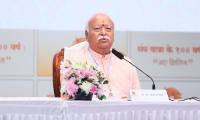Today the very water that fed them is being used to kill. The birds are being poisoned through this water. They are dropping dead by the thousands. JCB machines are digging mass graves. Lime is being put in these pits. The dead chickens are being carried in plastic bags and then thrown into this pit. The plastic is supposed to protect the person carrying the chickens. The Union government has promised to pay farmers Rs 40 per bird killed.
Will you keep off chicken and eggs? Tell us
The farmers are not happy. Bhakar Bai Teemol's farm is in Gujarat while his home is in the Nandurbar taluka of Maharashtra. He has been running around from his farm to his home and back. His people are helping the government destroy their livestock. The man is stoic. His voice did not break when he told rediff.com on the phone, "I have two units and have 45,000 birds. They are all layers. We do not have broilers. We sell eggs and not birds.
"Today they are killing all my birds. My farm is actually in Uchal, Gujarat, but then we are only 3 km from Navapura. That's where the bird flu has been detected. The government is killing all birds in a radius of 5 to 6 km. By Monday evening 12 lakh birds will be dead. The compensation that they are going to give will not even pay half my bank loan. They are saying don't do anything for a month till we give the go ahead. We will have to pay interest during the break. The Janta Sahakari Cooperative bank from where I took the loan will demand its money back. The government officials said that they would speak to the bank. It's not a nationalised bank so the bank might not listen to the government.'
He is too dejected to make any plans as of now.
Dilip Paradkar has been in the poultry business for 25 years. He used to work for MAFCO before he set up his own company to make micronutrients for poultry and dairy farms. He said that today seven farmers from the Navapura area had called him to take back his goods as there were no birds to feed. Initial indications are that the biggest hatchery in India is the only one that lost birds to the bird flu. Layers, that is chickens that are reared for their eggs, are are taken out when they are 70 weeks old. This did not happen this time.
At time the price of eggs was high. So the birds were not killed as usual. As they became older their resistance goes down. All the birds that died were more than 70 weeks old. Farmers say that younger birds if vaccinated might be more resistant to the flu. The farms have to be isolated. Nothing from the infected area is allowed anywhere near other farms. People working in the infected area will be quarantined till doctors clear them.
The whole area around farms will be fogged with chemical sprays. A bio-security shield needs to be put in place. Paradkar says, "Indians normally boil everything when they cook. The flu virus will not survive above 70 degrees celsius. When water boils, the flu cannot survive. Furthermore people should buy live birds and kill them. They should stop buying frozen chicken now atleast till this scare goes."
Poultry prices hit, sector waits for confirmation
The district of Dhule in Maharashtra was divided on July 1, 1998 to form two new districts -- Dhule and Nandurbar. Nandurbar, Navapur, Akkalkuwa, Taloda, Akrani, and Shahada talukas fall in Nandurbar district. The district headquarters is Nandurbar.
Boundaries: New Dhule district is to the south of Nandurbar, Gujarat is to the west and north, Madhya Pradesh is to the north and east. They have already started killing birds in neighbouring Gujarat.
Ghulam Bhai Hora has a poultry farm in Navapura. He led a delegation of poultry farmers to meet Maharashtra Chief Minster Vilasrao Deshmukh who had come to the district headquarters in Nandurbar on Monday. He told rediff.com, "The chief minister did his routine act. He did an aerial survery of the affected area. Held a meeting with the officials, met the affected people, took our petitions and left."
"We informed him that we would co operate with the government in preventing and eliminating the disease. The compensation has been worked from the 2004 Central guidelines for bird flu.
"What they have to realise is that costs have gone up since 2004. How can they give the same compensation for a 20 week bird and 70 week bird? We should get at least 75 rupees per bird on an average," he said.
The chief minister has promised us 10 rupees per bird as immediate relief from the chief minster's relief fund. We also asked for free power, waiving of power bills, tax waiver and a rehabiliation package when we start business again. Now we have been reduced to zero. There are 60 farmers and 5,000 adivasis daily wage earners affected.
"We all have bank loans. The interest should be waived and the principal should be paid back over a longer period.
"Even after they allow us to commence business it will take five months for the chickens to start laying eggs. This will cost us 105 rupees a bird."
So after killing birds the government has to isolate this area. It has to look after 5,000 Adivasis till the farms start working.








